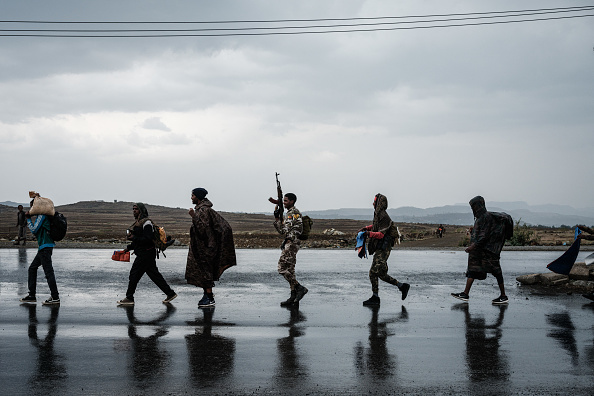Addis Ababa – The US embassy in Addis Ababa on Friday urged Americans to leave Ethiopia “as soon as possible” over fears of a rebel advance on the capital, as nine groups battling the government joined forces.
Concern over the country’s year-old conflict is escalating after Prime Minister Abiy Ahmed’s government declared a state of emergency and vowed to press on to victory in “an existential war.”
In an advisory, the US embassy warned “the security environment in Ethiopia is very fluid.”
It urged “citizens who are in Ethiopia to leave the country as soon as possible.”
ALSO READ | Rebel march on Ethiopia capital to worsen humanitarian crisis, says US
The warning came after several groups including the Tigray People’s Liberation Front (TPLF) – locked in a year-long conflict with the government – and the Oromo Liberation Army (OLA) announced a new alliance.
The TPLF said Wednesday that its fighters had reached the town of Kemissie in the Amhara region, 325km (200 miles) northeast of the capital, and were running “joint operations” with the OLA, which predicted Addis Ababa could fall in a matter of weeks.
Berhane Gebre-Christos, a TPLF representative who signed the nine-party agreement in Washington, said Friday that time was running out for Abiy.
“Our intention is to remove the regime,” he told reporters.
Security Council
The United Nations Security Council expressed “deep concern about the expansion and intensification of military clashes”, according to a joint statement released after their meeting on Friday in New York.
The council also expressed concern over the humanitarian situation and national stability, and “reaffirmed their strong commitment to the sovereignty, political independence, territorial integrity and unity of Ethiopia”.
The government has dismissed rebel claims of territorial gains, saying on Thursday that the TPLF was “encircled” and close to defeat.
It is unclear whether the alliance, named the United Front of Ethiopian Federalist and Confederalist Forces, will affect the trajectory of the conflict.
ALSO READ | Who is fighting the war in Ethiopia?
The TPLF and the OLA, which the government officially designated as terrorist groups in May, are well-known, but the other seven members are obscure, said one diplomat following security matters.
“If they are really serious about taking up arms against the government then it’s potentially a real problem for the government,” the diplomat told AFP on condition of anonymity.
But the diplomat cautioned: “I don’t know the majority of them, I don’t know how many people they have, what resources they have.”
Ethiopian officials on Friday called the alliance “a publicity stunt”.
Attorney General Gedion Timothewos told reporters that “some of those organisations are not really organisations that (have) any traction, that have any support base on the ground”.
‘Alarmist narrative’
Abiy’s spokeswoman Billene Seyoum on Friday accused the rebels of spinning “an alarmist narrative that is creating much tension among different communities, including the international community”.
“This information warfare and this propaganda that they have been propagating is giving a false sense of insecurity,” she added.
On Friday, the defence ministry called on veterans to re-enlist in the armed forces “to safeguard the country from a conspiracy to disintegrate it”.
On Thursday, lawmakers approved a six-month state of emergency that allows authorities to detain without a warrant anyone suspected of supporting “terrorist groups” or suspend media outlets believed to be “giving moral support directly or indirectly” to the TPLF.
ALSO READ | Ethiopia capital could be overrun in ‘months if not weeks’, rebels say
Rights watchdog Amnesty International on Friday slammed the emergency measures, calling them “a blueprint for escalating human rights violations”.
Two lawyers monitoring arbitrary detentions of Tigrayans in Addis Ababa told AFP this week they had received reports of dozens of people rounded up by police since the emergency was declared, some taken from their homes.
The new alliance could be an attempt by the TPLF to demonstrate it has a broad base of support across Ethiopia.
The TPLF attempted to put together a similarly diverse coalition in the late 1980s, ahead of toppling longtime autocratic ruler Mengistu Hailemariam in 1991.
That coalition, the Ethiopian People’s Revolutionary Democratic Front (EPRDF), went on to rule the country for nearly three decades before a prolonged protest movement brought Abiy to power in 2018.
Follow African Insider on Facebook, Twitter and Instagram
Picture: Getty Images
Source: AFP
For more African news, visit Africaninsider.com


